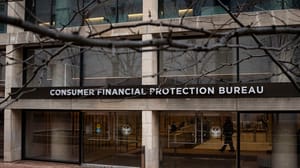Texas Court Stays DOL Fiduciary RuleTexas Court Stays DOL Fiduciary Rule
The court agreed that the Biden-era version of the fiduciary was structurally similar to the Obama-era rule. However, consumer advocates argue that plaintiffs are “forum-shopping” for sympathetic courts.

A Texas federal court temporarily stayed the Labor Department’s newest iteration of the fiduciary rule, arguing the rule “suffers from many of the same problems” as a previously-vacated version of a fiduciary standard for insurance professionals.
The Federation of Americans for Consumer Choice, an Austin, Texas-based lobbying group for independent insurance professionals, filed the suit against the DOL in May; the group previously filed a lawsuit in the same court several years prior seeking to void prior DOL fiduciary mandates released by the Trump administration.
It’s one of two ongoing lawsuits filed in Texas federal court attempting to strike down the latest fiduciary rule released earlier this year by the Biden administration.
The plaintiffs in that case include the American Council of Life Insurers, several regional divisions of the National Association of Insurance and Financial Advisors, the Insured Retirement Institute and Finseca, a trade group for financial services professionals.
In the FACC suit, the group argued the DOL wants to “fundamentally reshape” decades of settled practices in the insurance industry (the DOL wants any financial professional recommending a product to an investor when rolling over assets from an employer-based plan to an IRA to be considered a fiduciary).
President Joe Biden announced the latest version of the fiduciary rule last October in a broader effort to curb “junk fees” throughout numerous industries. The DOL released its final version in late April. It was to go into effect in September. The stay puts that on hold indefinitely or until the DOL appeals.
This rule follows attempts by previous administrations, including an Obama-era fiduciary rule struck down by the Fifth Circuit Court of Appeals in Texas. FACC argued in its call for a restraining order that the new rule mirrored the structure of the Obama-era version, and federal judges in Texas’ Eastern District agreed in the order granting the plaintiffs’ motion to stay the rule.
“In sum, the Court finds that Plaintiffs are likely to succeed on the merits of their claim that the 2024 Fiduciary Rule conflicts with ERISA’s text by redefining “investment advice fiduciary” to include non-trust-and-confidence relationships,” the order states. “The Court also finds that Plaintiffs would suffer irreparable harm in the absence of relief—as Defendants concede—and that the equities and public interest weigh in favor of a stay here.”
If the DOL appeals the ruling, it will head to the Fifth Circuit, as the Obama-era rule did when it was vacated (the Trump administration, which opposed the rule, opted not to appeal the Fifth Circuit’s decision in 2018).
In a discussion earlier this week hosted by the Institute for the Fiduciary Standard conducted before the order to stay was released, Phyllis Borzi, an assistant secretary for employee benefits at the DOL during the Obama administration, said it was difficult to predict what would eventually happen, but believed the new rule was “narrowly tailored, much better written and better focused” than the 2016 iteration.
Joseph Peiffer, the president of the Public Investors Advocate Bar Association and founding partner of the law firm Peiffer Wolf Carr Kane Conway & Wise, agreed. He felt the rule was desperately needed, as he thought the insurance industry made the securities industry “look like a bunch of librarians” regarding the frequency of misconduct.
“Whether this court challenge is successful, it really ought not to be,” he said. “The DOL went back, sharpened their pencils, and looked at what the Fifth Circuit did last time when overturning the rule, and really tailored the rule to survive a challenge in the Fifth Circuit.”
But Benjamin Schiffrin, the director of securities policy for Better Markets, said the issue of ‘forum-shopping’ by plaintiffs remained a pernicious problem for consumer advocates.
“An industry can just run to specific courts, be it specific district courts in the Fifth Circuit or the Fifth Circuit itself, any time it doesn’t like the rule and knows the Court isn’t going to agree with the rule because the Court has a certain ideological perspective,” he said.







